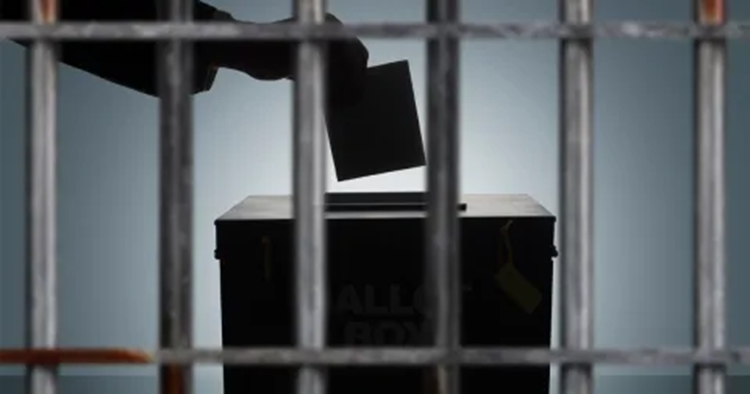- Courses
- GS Full Course 1 Year
- GS Full Course 2 Year
- GS Full Course 3 Year
- GS Full Course Till Selection
- CSAT
- 5 LAYERED ARJUNA Mentorship
- Public Administration Optional
- Online Program
- GS Recorded Course
- NCERT Batch
- Polity Module Course
- Geography Module Course
- Economy Module Course
- AMAC Module Course
- Modern India, Post Independence & World History Module Course
- Environment Module Course
- Governance Module Course
- Science & Tech. Module Course
- International Relations and Internal Security Module Course
- Disaster Management Module Course
- Ethics Module Course
- Essay Module Course
- Current Affairs Module Course
- ABOUT US
- OUR TOPPERS
- TEST SERIES
- FREE STUDY MATERIAL
- VIDEOS
- CONTACT US
Why an Accused Persons in Prison Contest Polls But Not Vote?
Why an Accused Persons in Prison Contest Polls But Not Vote?

In India, the Supreme Court has ruled that free and fair elections are a crucial element of the Constitution's "basic structure." However, voting is not considered a fundamental right.
Recently, Amritpal Singh, the imprisoned leader of the pro-Khalistan group Waris Punjab de, declared his intention to run for the Lok Sabha elections from Punjab's Khadoor Sahib seat.
- While his ability to campaign may be restricted, his right to contest polls remains intact unless he is convicted.
The Legal Status of Voting and Election Rights
Voting and Election Rights as Statutory Rights:
- In 1975, the Supreme Court recognized free and fair elections as part of the Constitution's basic structure, but voting and election rights were deemed "statutory rights" and not fundamental rights.
- For instance, a five-judge constitution Bench in 2006, in the case of Kuldip Nayar v. Union of India held that the right to vote (or the right to elect as it was called) is “pure and simple, a statutory right”. This means that voting is not a fundamental right and can be repealed.
- Parliament has the power to regulate both the right to vote and the right to be elected.
Bar Against Contesting Elections Only After Conviction: The Representation of People Act (RP Act) disqualifies individuals from contesting elections if they are convicted of certain offenses and face disqualification from the date of conviction and for six years after their release.
Exceptions to Disqualification:
- The Election Commission of India (ECI) is empowered under Section 11 of the RP Act to “remove” or “reduce” the period of disqualification.
- In 2019, the ECI used this power to reduce the period of disqualification faced by Sikkim Chief Minister Prem Singh Tamang who was released following a one-year prison sentence in 2018 for misappropriating funds in the procurement of cows.
- The Sikkim Krantikari Morcha leader went on to win in the bye-election for the Poklok Kamrang assembly seat.
- Another situation where a disqualified MP or MLA can still contest is when their conviction is stayed on appeal to a higher court.
- In 2019 the Supreme Court held that once a conviction is stayed “the disqualification which operates as a consequence of the conviction cannot take or remain in effect”.
- Dhananjay Singh, a former Bahujan Samaj Party MP whom a district court convicted for kidnapping in 2020, approached the Allahabad HC for a stay on his seven-year sentence which would allow him to contest in Lok Sabha elections. However, though the court granted bail, the court refused to stay the conviction stating that “it is the need of the hour to have purity in politics”.
Bar Against Voting for Confined Persons:
Voting Restrictions for Prisoners: Section 62 of the RP Act bars individuals confined in prison or in lawful police custody from voting.
Court Challenges and Arguments: The Supreme Court has upheld this restriction, citing reasons such as resource constraints, the need to restrict movement and speech of those in prison, and keeping "persons with criminal background away from the election scene."
In conclusion, while accused persons in prison can contest polls unless convicted, they are barred from voting. The right to vote is considered a statutory right, and various legal provisions and court rulings support the restrictions on voting for confined individuals.
Must Check: UPSC Coaching Institute In Delhi



